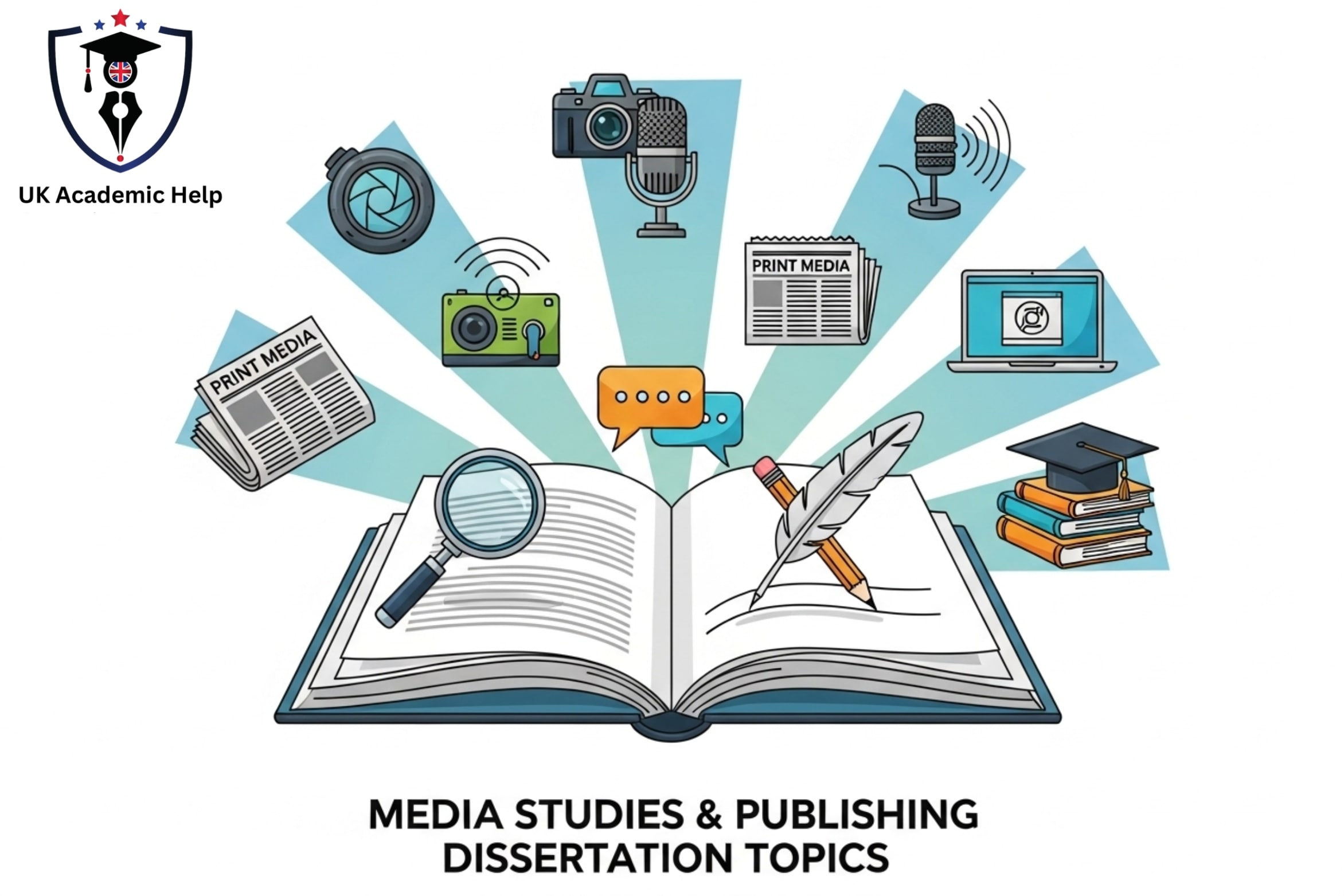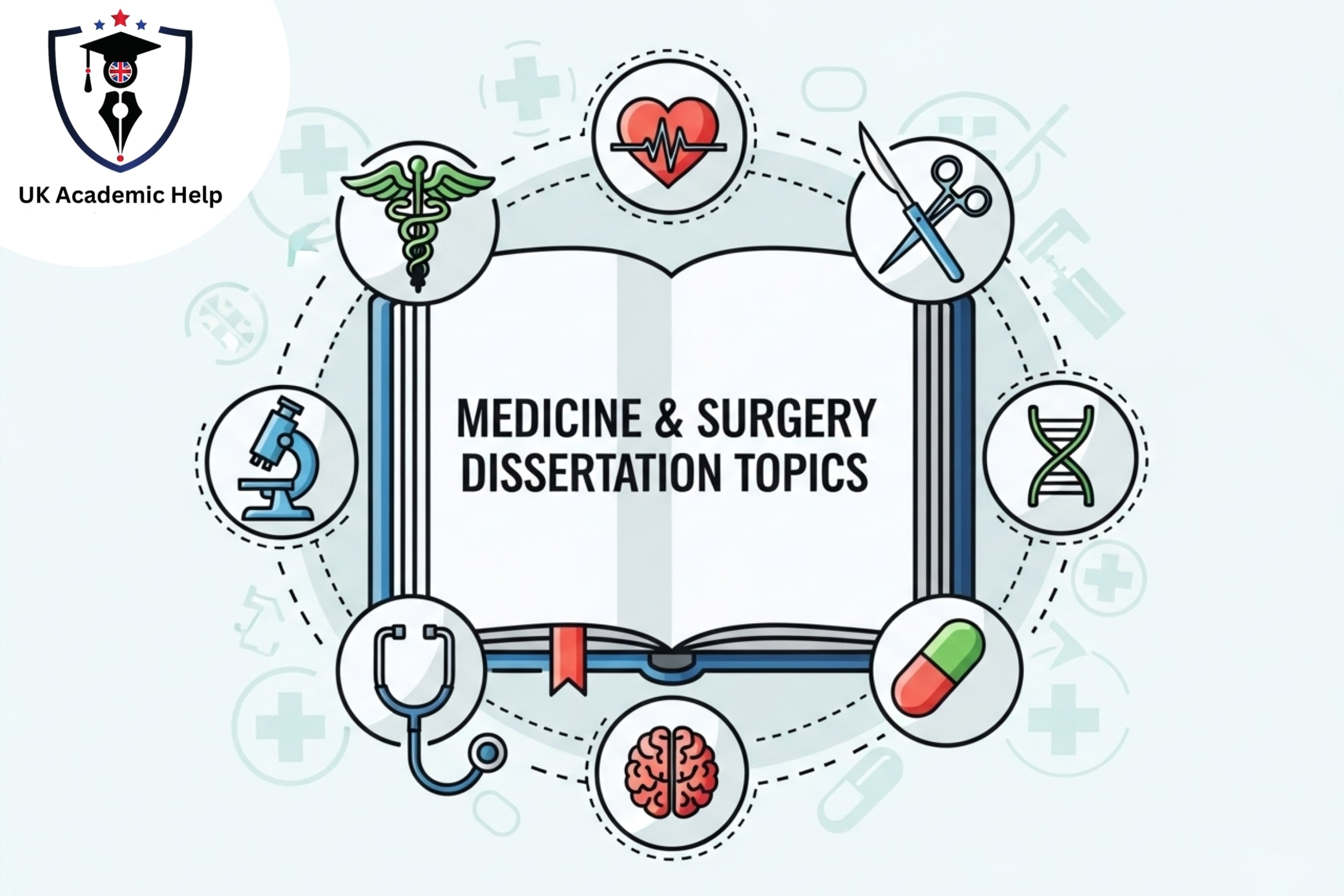Table of Contents
- 1 Why Choosing the Right Dissertation Topic Matters
- 2 How to Identify Your Interests and Passion
- 3 How to Research and Explore Dissertation Topics
- 4 How to Narrow Down Your Topic
- 5 Evaluating the Feasibility of Your Topic
- 6 How to Get Feedback from Your Tutor
- 7 Common Mistakes to Avoid
- 8 Explore Dissertation Topics for Every Subject
- 9 Conclusion
- 10 FAQ
Choosing a dissertation topic is one of the most difficult steps in the dissertation writing process. After all, the topic forms the foundation for the entire project. It sets the direction of your research, guides your studies, and shapes your academic journey.
But with so many potential ideas, how do you know which one is right for you?
Whether you’re pursuing a bachelor’s, master’s, or PhD, finding the right dissertation topic is key to ensuring success.
In this guide, we’ll walk you through the process of selecting a winning dissertation topic that aligns with your interests, academic goals, and future career aspirations.
Why Choosing the Right Dissertation Topic Matters
The importance of selecting the right dissertation topic cannot be overstated. A well-chosen topic can make the research process smoother, more enjoyable, and, most importantly, impactful. Your dissertation topic will:
- Reflect your passion: A topic that excites you makes the research process less daunting and more rewarding.
- Set the tone for your academic career: For higher-level students like master’s and PhD candidates, your dissertation topic could influence your future career, networking opportunities, and even potential job offers.
- Align with academic standards: Choosing a topic that aligns with your program’s requirements, expectations, and scope is essential.
- Showcase your research skills: A strong topic will allow you to demonstrate your ability to research, analyze, and contribute new knowledge to your field.
So, how do you begin the process of selecting the perfect dissertation topic? Let’s break it down.
How to Identify Your Interests and Passion
Before diving into the vast pool of potential topics, take some time to reflect on your academic interests and passions. What subjects have fascinated you the most throughout your degree? What topics have inspired your previous coursework, essays, or discussions? These areas of interest will serve as a great starting point.
Think About!
What excites you: A topic that sparks your curiosity will keep you motivated throughout your dissertation journey. Choose something that makes you eager to explore.
Your strengths and expertise: Reflect on the areas you have excelled in during your studies. Picking a topic within your strengths can give you the confidence to approach your research with authority.
If you’re unsure, brainstorm ideas by revisiting your lecture notes, past papers, and course materials. You may also want to explore current issues in your field that have yet to be fully researched, allowing you to contribute something unique.
How to Research and Explore Dissertation Topics
Once you’ve identified your interests, it’s time to start narrowing down your dissertation topic. This process involves researching existing literature, understanding the scope of your field, and identifying gaps where your research could add value. Here’s how to approach it:
Review academic journals: Explore scholarly articles, books, and online resources related to your subject. This will help you gain insights into what has already been explored and highlight areas that need further investigation.
Check recent trends: Stay updated with the latest developments in your field. For example, in business, you might explore emerging market trends, while in psychology, you could research new theories or mental health challenges.
Ask your professor: Seeking guidance from a professor or supervisor can help you refine your ideas. They may provide you with valuable insights and suggest directions you hadn’t considered.
Online research: Use databases, online forums, and academic websites to research your topic. Websites like Google Scholar and JSTOR are great places to start.
By gathering information on existing research, you’ll be able to identify key themes, research questions, and possible dissertation topics within your field.
How to Narrow Down Your Topic
It’s easy to get overwhelmed by all the possible topics you could explore, but narrowing down your dissertation topic is essential to ensure it’s manageable. Start by asking yourself a few key questions:
What is the scope of the topic? Your topic should be specific enough to allow for a deep analysis, but broad enough to explore different angles and findings. A dissertation that’s too narrow will be difficult to research, while one that’s too broad will lack focus.
Can it be researched within the time frame? Keep in mind the deadlines and duration of your dissertation process. Choosing a topic that can be adequately researched and analyzed within your time frame is essential for success.
Evaluating the Feasibility of Your Topic
Once you’ve narrowed down your options, it’s time to evaluate their feasibility. Ask yourself these questions:
Can I access relevant sources? Ensure there are enough academic resources—books, articles, data, or case studies—available to support your research.
Is the topic relevant to my field? Make sure your chosen topic aligns with the objectives of your degree program, whether it’s a business dissertation, education dissertation, or one in any other field.
Is it realistic to research? Consider practical aspects like data availability, research methods, and ethical concerns.
If your topic meets all these criteria, then it’s likely a viable choice.
How to Get Feedback from Your Tutor
One of the most valuable steps in choosing a dissertation topic is getting feedback from your tutor or supervisor. They are there to guide you through the process and can help refine your ideas, suggest areas for improvement, and ensure your chosen topic meets academic standards.
Here’s how to make the most of this feedback:
Be clear about your idea: Present your topic idea clearly to your tutor. Explain why you are interested in it and the direction you want your research to take. This helps your tutor understand your vision and provide specific advice.
Ask for constructive feedback: Instead of asking if the topic is “good,” ask for specific feedback on aspects like scope, relevance, and research feasibility. For example, you can ask, “Do you think this topic is manageable within the time frame?” or “Are there any gaps in the current literature I should consider?”
Be open to suggestions: Your tutor may offer alternatives or modifications that make your topic stronger. Be open to their ideas and use their expertise to refine your dissertation focus.
Getting regular feedback is important for staying on track and ensuring your dissertation meets academic expectations.
Need a custom dissertation abstract? Message our experts on WhatsApp +44 744 191 5956 for a FREE personalized abstract or contact us here: Get Free Abstract!
Common Mistakes to Avoid
Choosing a dissertation topic can be tricky, and many students make mistakes along the way. Here are some common pitfalls to avoid:
Choosing an overly broad topic: A dissertation that is too broad lacks focus and will be difficult to manage. For example, a topic like “The history of education” is too wide, while something more specific, like “The evolution of online learning in higher education,” would allow for deeper analysis.
Choosing a topic with no research material: It’s essential to choose a topic that has enough existing research material for you to reference. If there’s not enough literature or data available, your research could stall.
Ignoring feasibility: Make sure your topic is realistic and can be completed within your timeline and budget. Avoid choosing a topic that requires resources you can’t access or research methods you’re not familiar with.
Disregarding personal interest: Your dissertation is a long journey, and if you’re not passionate about the topic, you may lose motivation. Be sure to choose a subject that excites and challenges you.
By avoiding these common mistakes, you’ll be better positioned to select a topic that is both manageable and engaging.
Explore Dissertation Topics for Every Subject
Different fields of study require different approaches to choosing a dissertation topic. Let’s explore some dissertation topics across various subjects to help you get started.
Business and Management:
- The impact of social media marketing on consumer behaviour
- Corporate social responsibility in multinational corporations
- Innovation strategies in small and medium-sized enterprises (SMEs)
- Sustainable business practices in the global economy
Psychology:
- The effects of social media on adolescent mental health
- Cognitive-behavioral therapy for anxiety disorders
- The role of childhood trauma in the development of personality disorders
- The relationship between mindfulness and emotional regulation
Education:
- The effectiveness of online learning in primary education
- Teacher burnout: Causes and solutions
- The role of technology in modern classrooms
- Strategies for improving student engagement in higher education
Engineering:
- Renewable energy solutions for sustainable cities
- The future of autonomous vehicles in urban transportation
- Advances in smart materials for construction
- Energy-efficient building designs in urban development
Check More: Engineering Dissertation Topics
Law:
- The impact of data protection laws on digital marketing
- The role of international law in resolving conflicts in the Middle East
- Human rights violations and their impact on global justice
- Cybersecurity laws in the era of digital transformation
Check More: Law Dissertation Topics
Need a custom dissertation topic? Send our experts a message on WhatsApp +44 744 191 5956 for a FREE personalized topic or contact us here: Get Free Topic!
These are just a few examples. Depending on your field of study, your dissertation topic should reflect current trends, challenges, or advancements within that area. Think about what’s happening in your field today, and consider choosing a topic that aligns with both academic trends and your career aspirations.
Conclusion
Choosing a dissertation topic can be daunting, but it’s also an exciting opportunity to contribute to your field. By following the steps outlined in this guide—identifying your passions, researching existing literature, narrowing down your focus, and seeking feedback—you can select a topic that’s both meaningful and manageable.
Remember, your dissertation is not just an academic requirement; it’s a chance to explore something that interests you deeply and adds value to your field. Stay focused, avoid common mistakes, and don’t hesitate to seek support from your tutors or peers along the way.
And remember, if you need assistance with your dissertation writing or any other academic task, UK Academic Help is here to support you with professional dissertation help, editing and proofreading services, and more. We’re dedicated to helping you succeed at every stage of your academic journey.
FAQ
How do I know if my dissertation topic is too broad?
If your topic is too broad, it will be difficult to explore in-depth within the given word count and timeframe. To ensure your topic is focused, try to narrow it down by looking at specific aspects of the subject, such as a particular region, time period, or case study. For example, instead of “Climate Change,” focus on “The Impact of Climate Change on Coastal Communities in the UK.”
How do I come up with a unique dissertation topic?
Brainstorming and reviewing current research trends are great ways to find unique dissertation topics. Read recent journal articles, attend academic conferences, or discuss potential topics with your tutor. By identifying gaps in existing research or exploring emerging trends, you can uncover a unique angle for your dissertation.
How do I ensure my dissertation topic is researchable?
A researchable dissertation topic is one that can be supported by data, existing literature, or experiments. Make sure there’s enough relevant research material available to support your dissertation. You can do this by conducting a preliminary literature review to determine whether your chosen topic has sufficient resources and research opportunities.
Can I change my dissertation topic after starting?
While it’s possible to change your topic after starting your dissertation, it’s best to do so early in the process to avoid wasting time. Changing topics later can delay your progress, especially if you’re deep into your research. Always consult with your tutor or supervisor if you feel the need to make changes.
What if I can’t think of a good dissertation topic?
If you’re struggling to come up with a dissertation topic, try to revisit your course materials, past assignments, or research papers that sparked your interest. Look for themes or unresolved questions that you can explore further. Additionally, discussing ideas with peers or your tutor may help you gain clarity.








Leave A Comment